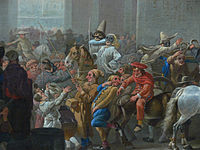Junkanoo
| Music of the Anglophone Caribbean | ||||
| Genres | ||||
|---|---|---|---|---|
|
|
||||
|
|
||||
| Regional music | ||||
|
||||
Junkanoo is a street parade with music, dance, and costumes in many towns across the Bahamas every Boxing Day (December 26) and New Year's Day (January 1). The largest Junkanoo parade happens in the capital New Providence. There are also Junkanoo parades in Miami in June and Key West in October, where local black American populations have their roots in The Bahamas. In addition to being a culture dance for the Garifuna people,[1][2] this type of dancing is also performed in The Bahamas on Independence day and other historical holidays.
Dances are choreographed to the beat of goatskin drums and cowbells.
History

The origin of the word junkanoo is disputed. Theories include that it is named after a folk hero named John Canoe or that it is derives from the French gens inconnus (unknown people) as masks are worn by the revelers.[3] Douglas Chambers, professor of African studies at the University of Southern Mississippi, suggests a possible Igbo origin from the Igbo yam deity Njoku Ji referencing festivities in time for the new yam festival. Chambers also suggests a link with the Igbo okonko masking tradition of southern Igboland which feature horned maskers and other masked characters in similar style to jonkonnu masks.[4] Many of the colonies Jonkonnu was prominent, Bahamas, Jamaica, Virginia, had a relatively high percentage of Igbo people among the enslaved African population.[4] Similarities with the Yoruba Egungun festivals have also been identified.[5]
The festival may have originated several centuries ago, when slaves on plantations in The Bahamas celebrated holidays granted around Christmas time with dance, music, and costumes. After emancipation the tradition continued and junkanoo evolved from simple origins to a formal,organised parade with intricate costumes, themed music and official prizes within various categories.
Popular culture
The Junkanoo parade has featured in movies including the James Bond film Thunderball, After the Sunset and Jaws The Revenge.
In television show Top Chef: Allstars Season 8, episode 13, "Fit for a King", the contestants danced at the Junkanoo parade, learned about its history and competed to make the best dish for the Junkanoo King.
-
Rush for Peace Freeport Bahamas 2011
-
Costume sans participant after the parade
-
Junkanoo costume
-
Junkanoo costume
See also
- Carnival
- Pitchy patchy
- John Canoe, a related practice
References
- ^ Ericka Hamburg (December 23, 2007), Free to dance - Belize's liberating Jonkonnu celebration recalls a slavery-era tradition, Los Angeles Times, p. 3, retrieved October 15, 2013
- ^ Gene Scaramuzzo (April 28, 1989), African-Caribbean Music Takes Off, The Times-Picayune, p. L21
{{citation}}:|access-date=requires|url=(help) - ^ "What is Junkanoo". Official Website of the Bahamas Tourist Office. The Bahamas Tourist Office UK. Retrieved 22 December 2015.
- ^ a b Chambers, Douglas B. (March 1, 2005). Murder at Montpelier: Igbo Africans in Virginia. University Press of Mississippi. p. 182. ISBN 1-57806-706-5.
- ^ Allsop, Richard (2003). The Dictionary of Caribbean English Usage. Jamaica: University of the West Indies Press. p. 776. ISBN 978-976-640-145-0.
Sources
- Bethel, Clement. Junkanoo: Festival of the Bahamas. Macmillan Caribbean, 1992.
- Nissenbaum, Stephen. The Battle for Christmas. New York: Vintage Books, 1997.
- Wisdom, Keith Gordon. Bahamian Junkanoo: An Act in a Modern Social Drama (Dissertation)
- Wood, Vivian Nina Michelle. Rushin' hard and runnin' hot: Experiencing the music of the Junkanoo Parade in Nassau, Bahamas (Dissertation)





